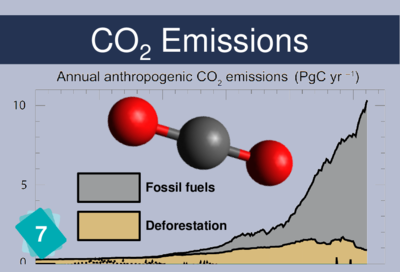En-en adult card 7 co2 emissions: Difference between revisions
Jump to navigation
Jump to search
m (Link to French) |
(Structure change) |
||
| (4 intermediate revisions by the same user not shown) | |||
| Line 1: | Line 1: | ||
== Card #7: CO<sub>2</sub> emissions == | |||
<center> | |||
== | [[File:En-en_adult_card_7_front.png|400px]] | ||
CO<sub>2</sub>, or carbon dioxide, is the main anthropogenic (produced by human activities) greenhouse gas in terms of emissions. These emissions come from our use of fossil fuels and from deforestation. | |||
</center> | |||
== Correction == | |||
=== Causes === | === Causes === | ||
* [[En-en adult card 5 fossil fuels|Fossil fuels]] Coal, oil and natural gas emit CO<sub>2</sub> during combustion. | |||
* [[En-en adult card 6 deforestation|Deforestation]] emits CO<sub>2</sub> because a large proportion of deforestation caused by man is achieved by burning the forests. | * [[En-en adult card 6 deforestation|Deforestation]] emits CO<sub>2</sub> because a large proportion of deforestation caused by man is achieved by burning the forests. | ||
=== Current energy mix | === Consequences === | ||
* [[En-en adult card 12 carbon sinks|Carbon sinks]] | |||
== Wrong links== | |||
=== Wrong consequences=== | |||
*[[En-en adult card 11 concentration of co2|Concentration of CO<sub>2</sub>]] The correct link is via the carbon sinks card. | |||
*[[En-en adult card 24 ocean acidification|Ocean acidification]] The correct link is via the carbon sinks card. | |||
==Current energy mix== | |||
=== Global === | |||
The global energy mix is 85% dependent on fossil fuels<ref> [https://www.planete-energies.com/en/medias/close/what-energy-mix Global energy mix] </ref> and today renewable energy sources tend to add capacity rather than replace fossil fuels. | The global energy mix is 85% dependent on fossil fuels<ref> [https://www.planete-energies.com/en/medias/close/what-energy-mix Global energy mix] </ref> and today renewable energy sources tend to add capacity rather than replace fossil fuels. | ||
===France=== | |||
In France in 2018, the final energy consumption (at consumer level) split by primary energy source was as follows<ref> [https://fr.wikipedia.org/wiki/%C3%89nergie_en_France Energy in France by Wikipedia (in French)] </ref>: | In France in 2018, the final energy consumption (at consumer level) split by primary energy source was as follows<ref> [https://fr.wikipedia.org/wiki/%C3%89nergie_en_France Energy in France by Wikipedia (in French)] </ref>: | ||
* Fossil fuels: 67.4% (coal 1.9%, oil 44.0%, natural gas 21.5%) | *Fossil fuels: 67.4% (coal 1.9%, oil 44.0%, natural gas 21.5%) | ||
* nuclear: 17.7% | *nuclear: 17.7% | ||
* renewables: 14.9% (biomass-waste 9.8%, hydropower 3.0%, wind 1.2%, solar 0.5% (mainly photovoltaic), other 0.3%). | *renewables: 14.9% (biomass-waste 9.8%, hydropower 3.0%, wind 1.2%, solar 0.5% (mainly photovoltaic), other 0.3%). | ||
== References == | ==References== | ||
<references/> | <references /> | ||
[[fr:Fr- | [[fr:Fr-fr_adulte_carte_7_émissions_de_co2]] | ||
Latest revision as of 13:47, 30 October 2021
Card #7: CO2 emissions
CO2, or carbon dioxide, is the main anthropogenic (produced by human activities) greenhouse gas in terms of emissions. These emissions come from our use of fossil fuels and from deforestation.
Correction
Causes
- Fossil fuels Coal, oil and natural gas emit CO2 during combustion.
- Deforestation emits CO2 because a large proportion of deforestation caused by man is achieved by burning the forests.
Consequences
Wrong links
Wrong consequences
- Concentration of CO2 The correct link is via the carbon sinks card.
- Ocean acidification The correct link is via the carbon sinks card.
Current energy mix
Global
The global energy mix is 85% dependent on fossil fuels[1] and today renewable energy sources tend to add capacity rather than replace fossil fuels.
France
In France in 2018, the final energy consumption (at consumer level) split by primary energy source was as follows[2]:
- Fossil fuels: 67.4% (coal 1.9%, oil 44.0%, natural gas 21.5%)
- nuclear: 17.7%
- renewables: 14.9% (biomass-waste 9.8%, hydropower 3.0%, wind 1.2%, solar 0.5% (mainly photovoltaic), other 0.3%).
